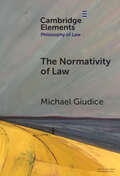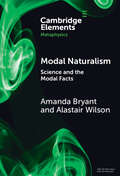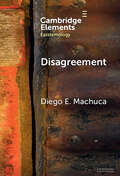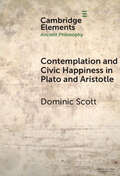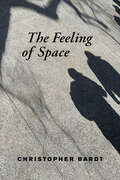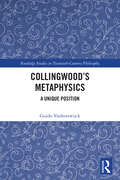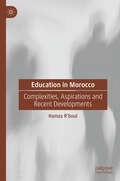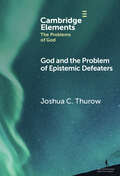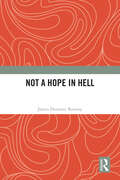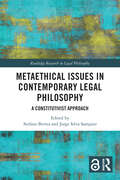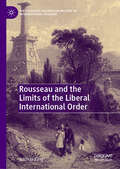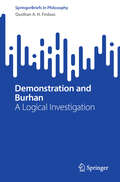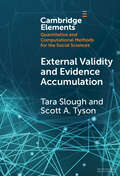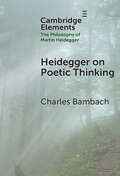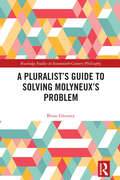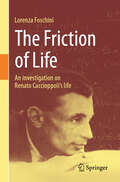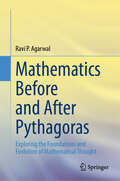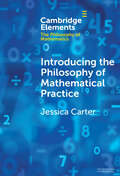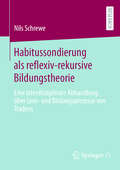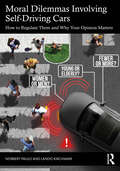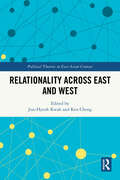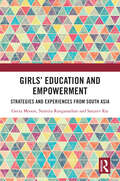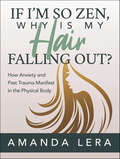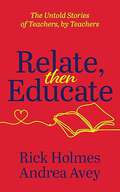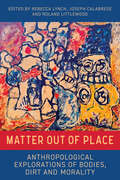- Table View
- List View
The Normativity of Law (Elements in Philosophy of Law)
by Michael GiudiceIn the philosophy of law there has been a proliferation of advanced work in the last thirty years on the normativity of law. Recent theories explore law's character as a special kind of convention, shared cooperative activity, and social artifact, among other perspectives, to explain the precise way in which law provides subjects with reasons for action. Yet, for all their sophistication, such accounts fail to deliver on their promise, which is to establish how law creates more than just legal reasons for action. This Element aims to survey these views and others, situate them in a broader context of theories about the nature of law, and subsequently suggest a path forward based on the methodological continuity between analytical, evaluative, and empirical approaches to law's normativity.
Modal Naturalism: Science and the Modal Facts (Elements in Metaphysics)
by Amanda Bryant Alastair WilsonHow do we know what is possible or impossible, what is inevitable or unattainable, or what would happen under which circumstances? Since modal facts seem distinctively mysterious and difficult to know, the epistemology of modality has historically been fraught with uncertainty and disagreement. The recent literature has been dominated by rationalist approaches that emphasise a priori reasoning (sometimes including direct intuition of possibility). Only recently have alternative approaches emerged which recognize a broader range of sources of modal knowledge. Yet even emerging non-rationalist views have tended to assign scientific investigation at best a supporting role. Our project in this book is to develop and defend a new approach to the epistemology of modal facts which assigns a central role to scientific investigation. According to modal naturalism, science (construed broadly) is our primary source of evidence concerning the modal facts.
Disagreement (Elements in Epistemology)
by Diego E. MachucaThis Element engages with the epistemic significance of disagreement, focusing on its skeptical implications. It examines various types of disagreement-motivated skepticism in ancient philosophy, ethics, philosophy of religion, and general epistemology. In each case, it favors suspension of judgment as the seemingly appropriate response to the realization of disagreement. One main line of argument pursued in the Element is that, since in real-life disputes we have limited or inaccurate information about both our own epistemic standing and the epistemic standing of our dissenters, personal information and self-trust can rarely function as symmetry breakers in favor of our own views.
Contemplation and Society in Plato and Aristotle (Elements in Ancient Philosophy)
by Dominic ScottThis Element concerns the civic value of contemplation in Plato and Aristotle: how does intellectual contemplation contribute to the happiness of the ideal state? The texts discussed include the Republic, the Nicomachean Ethics and the Politics, works in which contemplation is viewed from a political angle. The Element concludes that in the Republic contemplation has purely instrumental value, whereas in the Politics and Nicomachean Ethics it has purely intrinsic value. To do justice to the complexity of the issues involved, the author addresses a broader question about the nature of civic happiness: whether it is merely the aggregate of individual happiness or an organic quality that arises from the structure of the state. Answering this question has implications for how contemplation contributes to civic happiness. The Element also discusses how many citizens Plato and Aristotle expected to be engaged in contemplation in the ideal state.
The Feeling of Space
by Christopher BardtA richly illustrated exploration of humanity’s drive to shape life as a spatial project, from Plato’s time to the digital era.Place is something real, but space is generally conceived as abstract and immaterial. In The Feeling of Space, Christopher Bardt explores this damaging modern binary and traces the contradictory impulses that have dematerialized our sense of space through history: fear and wonder; a yearning for the infinite and intimate; and the need for autonomy and belonging. Using rich illustrations and examinations of art, technology, and philosophy, Bardt argues that if we can get back to first feeling space, then we can treat space as the substance that gives agency to our intersubjectivity—the exchange of conscious and unconscious thoughts we have with others. Expertly connecting ideas with clear examples from lived experiences, Bardt’s revolutionary framework will appeal to a broad readership, particularly those who are interested in the theoretical and philosophical aspects of spaces. In an age where digital media has dissolved, instead of increased, our sense of connection, The Feeling of Space shows that when we learn to experience space as a medium as real as a place, we not only see ourselves as inherently spatialized beings, but we can also rebuild the bonds that tie us together.
Collingwood’s Metaphysics: A Unique Position (Routledge Studies in Twentieth-Century Philosophy)
by Guido VanheeswijckThis book explores R.G. Collingwood’s concept of metaphysics. It traces the evolution of Collingwood’s thought on metaphysics through his published work, posthumously published manuscripts and recently discovered course notes.From 1933 to 1936, Collingwood’s thought shifted considerably from the more orthodox Hegelian treatment of metaphysics as the study of the general nature of reality to the more ‘historicist’ study of absolute presuppositions. This radical conversion hypothesis has been for a long time the single most important issue in the interpretation of Collingwood’s philosophy. This book provides a fresh reappraisal of his thinking on metaphysics during these crucial years. It argues that objective idealism is the key to unraveling the true scope of Collingwood’s metaphysics. This theory takes a mid- position between mainstream interpretations in the secondary literature and forms the background to many of Collingwood’s key ideas regarding metaphysics, the philosophy of nature and the philosophy of history. The book also compares Collingwood’s concept of metaphysics to that of his predecessors, contemporaries and followers. The second part of the book focuses in detail on the similarities and differences between Collingwood’s metaphysics and, in chronological order, the views on metaphysics of Dilthey, Whitehead, Ayer, Wittgenstein, Heidegger, Berlin, Kołakowski, Strawson and Taylor.Collingwood’s Metaphysics will be of interest to scholars and graduate students interested in Collingwood’s philosophy, 20th- century philosophy and metaphysics.
Education in Morocco: Complexities, Aspirations and Recent Developments
by Hamza R'boulThis book provides a comprehensive overview of historical and postmodern developments in the Moroccan education system, in order to construct a deeper understanding of its structural, linguistic and epistemic complexities. The chapters provide readers with a nuanced grasp of education and its intersections with wider geopolitical, sociopolitical and sociocultural conditions in Morocco as a postcolonial Southern country which is actively seeking to consolidate its position internationally. Covering education from primary school to university, the book features critical reflections on topics such as language-in-education, policy and planning, the politics of education, globalization and nationalist rhetoric. The book is an important reference for anyone interested in understanding the complexities of the education system in Morocco, and more specifically students and scholars who are interested in the sociology of education as well as education and language policy and planning.
God and the Problem of Epistemic Defeaters (Elements in the Problems of God)
by Joshua ThurowAny modern, moderately intellectually mature (MMIM) believer in God faces a variety of epistemic defeaters of their belief in God. Epistemic defeaters challenge the rationality of a belief. After explaining the notion of a defeater and discussing various ways and targets of defeat, this Element categorizes the many defeaters of belief in God into four classes: rebutting, undercutting, base defeaters, and competence defeaters. Then, several general defeaters of theistic belief are examined in some detail: the superfluity argument, the problem of unpossessed evidence, various forms of debunking arguments, and a cumulative case competence defeater. The typical MMIM believer, it is argued, has resources to resist these defeaters, although the cumulative case competence defeater has some force. The strength of its force depends on the strength of grounds for theistic belief and of various defeaters and deflectors for the competence defeater. No easy general defeater of theistic belief is found.
Not a Hope in Hell
by James Dominic RooneyIt is frequently claimed that an all-loving and good God cannot permit anyone to end up in hell. In this book, the author shows that this issue of God's permission of hell has an intimate connection with age-old questions regarding why God would permit sin. Indeed, focus on why an all-loving and good God would permit hell is the best lens through which to explain sin.Many arguments against the possibility of hell require affirming that God permits sin because God could not achieve goods for us without allowing sin. The author argues that we have independent philosophical reasons to reject that sin is necessary for us in any way, and, further, we have similar reasons to hold that hell is necessarily possible if the God of classical theism exists. In the end, understanding why an all-loving and good God would permit hell reveals that there is always hope for us, even when things appear most hopeless.The book will appeal to those working in metaphysics, theology, philosophy of religion, and medieval philosophy.
Metaethical Issues in Contemporary Legal Philosophy: A Constitutivist Approach (Routledge Research in Legal Philosophy)
by Stefano Bertea and Jorge Silva SampaioThis volume explores the importance of constitutivism for legal studies. Constitutivism is the view that the normative force, or authority, of practical reasons is grounded in principles, capacities, aims, or functions that are essential to, and thus constitutive of, agency. While the implications that the constitutivist approach has on the fundamental metaethical disputes and central ethical debates have been extensively explored, the literature on the relations between constitutivism and law remains scarce, unsystematic, and sporadic. This collection brings together world-renowned practical philosophers and legal theorists to fill a noticeable gap in the literature. The authors systematically and innovatively address key dimensions of the relationships between constitutivism and the theoretical study of law, as well as programmatically offering novel insights into the conceptual connections between constitutivist claims, fundamental legal concepts and practices, legal issues, and, ultimately, the law as a distinctive concept. The book will be of interest to academics and researchers working in the areas of Legal Philosophy, Legal Theory, Jurisprudence, Moral Philosophy and Metaethics.
Rousseau and the Limits of the Liberal International Order (The Palgrave Macmillan History of International Thought)
by Joshua KingJean-Jacques Rousseau’s international thought anticipates many of the political dynamics that have arisen through globalization and great power competition. Rousseau and the Limits of the Liberal International Order considers Rousseau as a critic and a reformer of international politics, arguing that Rousseau’s account of liberty drives his approach to the international realm. Rousseau’s work provides an incisive critique. He dismantles notions of economic rationalism, rejects the preference for administration over self-governance, and encourages strategies of resistance as a meaningful response to great power rivalry. To address these concerns, Rousseau affirms an approach to international politics that is closely related to his account of political liberty. For Rousseau, liberty develops through one’s carefully chosen obligations that encourage self-rule, limit dependence on others, and constrain the irrational motives of politics. To pursue these goals, Rousseau proposes civic education and national institutions that cultivate a sense shared of humanity and limit the use of war. These alternatives moderate the desire for status and establish a form of national interest directed towards contentment and pluralism rather than competition. Rousseau acknowledges significant limits to these solutions. Citizenship creates substantive divisions among human beings, and the pursuit of national self-sufficiency may leave the state vulnerable to more powerful neighbors. Emphasizing these trade-offs draws attention to competing sources of human obligation and to the unsatisfying ways that international politics attempts to harmonize them.
Demonstration and Burhan: A Logical Investigation (SpringerBriefs in Philosophy)
by Qusthan A. FirdausThis book investigates the historical development of Aristotle’s perfect syllogism, or demonstration, into the Muslim world. It provides an accessible account to the modern reader, while at the same time bringing to the discussion the important issue of the specifically Muslim contribution to the field of logic. The author emphasizes the importance of axioms in establishing demonstration and the modern logic of dialetheia - Graham Priest’s idea of some true contradictions - in Islamic discourses. While Muslim philosophers have been claiming that demonstration is equal to burhan in mantiq or logic in Islamic education, this book presents the fact that burhan sets aside the necessity of axioms, making the former seem to be a deviation from Aristotle’s demonstration. The variety of Islamic philosophies has not been adequate enough to develop logic in Islamic education as progressive as its European counterparts. This book is an invitation to students and researchers to reconsider mantiq or logic in Islamic education based upon the Aristotelian logic and the modern logic of dialetheia, given that one cannot comprehend various Islamic discourses simply by exercising the Aristotelian principles of identity, non-contradiction, and excluded middle. In providing a useful overview of Aristotle before launching into a discussion on the various positions that Muslim scholars take regarding demonstration, the author presents a better framework for scholars and students in philosophy and religious studies to grasp several controversial and peculiar ideas in Islam.
External Validity and Evidence Accumulation (Elements in Quantitative and Computational Methods for the Social Sciences)
by Tara Slough Scott A. TysonThe accumulation of empirical evidence that has been collected in multiple contexts, places, and times requires a more comprehensive understanding of empirical research than is typically required for interpreting the findings from individual studies. We advance a novel conceptual framework where causal mechanisms are central to characterizing social phenomena that transcend context, place, or time. We distinguish various concepts of external validity, all of which characterize the relationship between the effects produced by mechanisms in different settings. Approaches to evidence accumulation require careful consideration of cross-study features, including theoretical considerations that link constituent studies and measurement considerations about how phenomena are quantifed. Our main theoretical contribution is developing uniting principles that constitute the qualitative and quantitative assumptions that form the basis for a quantitative relationship between constituent studies. We then apply our framework to three approaches to studying general social phenomena: meta-analysis, replication, and extrapolation.
Heidegger on Poetic Thinking (Elements in the Philosophy of Martin Heidegger)
by Charles BambachOne of the striking features of Heidegger's philosophical engagement concerns his privileging of poetry and poetic thinking. In this understanding of language as fundamentally poetic, Heidegger puts forward a different way to do philosophy. In this Element, the author places Heidegger's poetic thinking in conversation with Sophocles and Hölderlin as a way to situate his critique of global technology and instrumental thinking in the postwar years. This Element also offers a critique of Heidegger's efforts to arrogate poetic thinking to his own aim of a destinal form of German national self-assertion through poetry. Overall, the aim here is to show how crucial poetic thinking is to the way Heidegger understands philosophy as a radical engagement with language.
A Pluralist’s Guide to Solving Molyneux’s Problem (Routledge Studies in Seventeenth-Century Philosophy)
by Brian GlenneyThis book presents a novel pluralist strategy for answering Molyneux’s 300+-year-old conundrum: Would a person, born blind but given sight, identify a shape previously known only by their touch? The author interweaves historical scholarship with contemporary philosophical work and empirical research on animal, infant, and adult human perception.The author argues that we need a new approach to Molyneux’s problem because we do not know what the problem is really about, and it is untestable because a Molyneux subject cannot be physically realized. He criticizes Molyneux’s question for its simplistic taxonomy of "the blind" that groups significant individual differences into a singular ontology. Research in the cognitive sciences confirms that various kinds of blindness can co-occur, such as ocular, cortical, and psychological blindness. Therefore, the author adopts an explanatory pluralism for answering Molyneux’s problem, which includes no, yes, and "no answer" answers according to the domain of inquiry being used. This account provides a research-based answer to a long-standing problem using previously unheeded insights particularly from animal crossmodal perception studies to retell a more complex story of perception: its levels of explanation and integration.A Pluralist’s Guide to Solving Molyneux’s Problem will be of interest to researchers and advanced students working in comparative psychology, epistemology, history of philosophy, philosophy of perception.
The Friction of Life: An investigation on Renato Caccioppoli's life
by Lorenza FoschiniNaples, May 8, 1959. Renato Caccioppoli, a mathematical genius, prodigious pianist, captivating storyteller, highly cultured and multilingual, believed to be the grandson of the anarchist movement founder Mikhail Bakunin, takes his own life by shooting himself in the back of the head in his residence at Palazzo Cellammare.Adored by students and colleagues, a symbol of freedom and non-conformity for an entire generation, Caccioppoli enchanted not only some of the most celebrated intellectuals of the century – André Gide, Pablo Neruda, Eduardo De Filippo, Benedetto Croce, Alberto Moravia, Elsa Morante – but also, and above all, the people of Naples, who have always regarded him with amazed admiration. Persecuted by the fascist regime, afflicted by what the writer and friend Paola Masino would describe as "the friction of life," his death permanently places him in the city's history.This meticulous and well-documented investigation tells us who Caccioppoli truly was and offers us an un-stereotyped and, in some ways, unprecedented portrayal of a legendary Naples.
Mathematics Before and After Pythagoras: Exploring the Foundations and Evolution of Mathematical Thought
by Ravi P. AgarwalThis book provides the reader with a comprehensive account of the contributions of Pythagoras to mathematics and philosophy, using them as a starting point to compare pre-Pythagorean accomplishments with the myriad mathematical developments that followed. It begins with a thorough study of Pythagoreanism and the early Pythagoreans, including the major events in Pythagoras' life and the origins of the mystical significance attributed by Pythagoreans to natural numbers. From Chapter 3 onward, the book describes how mathematical thinking works and prepares the reader for the subsequent chapters, which cover mathematical logic and proofs, their application to the study of natural and prime numbers, the investigation of Pythagorean triples, figurative numbers, and irrational numbers, all interwoven with rich historical context. Aimed at students and teachers at all levels, this work is accessible to non-mathematicians as well, with the main prerequisite being an avid curiosity about some of the ideas and thinkers that helped to forge the mathematical world as we know it. Early praises for “Mathematics Before and After Pythagoras”: “Your book is charming and fun to read. It would be fine to be able to teach from it.” (Steve Krantz, USA) “...your new book, an obvious labor of love... I can see that it will be an inspiration for young students.” (Bruce Berndt, USA) “It is an excellent book, and I am deeply grateful for sending it to me. It is an extraordinary gift, and I am so grateful for this.” (Carlo Cattani, Italy) “I am really impressed by the wealth of interesting material you have collected and presented.” (Rainer Kress, Germany)
Introducing the Philosophy of Mathematical Practice (Elements in the Philosophy of Mathematics)
by Jessica CarterThis Element introduces a young field, the 'philosophy of mathematical practice'. We first offer a general characterisation of the approach to the philosophy of mathematics that takes mathematical practice seriously and contrast it with 'mathematical philosophy'. The latter is traced back to Bertrand Russell and the orientation referred to as 'scientific philosophy' that was active between 1850 and 1930. To give a better sense of the field, the Element further contains two examples of topics studied, that of mathematical structuralism and visual thinking in mathematics. These are in part presented from a methodological point of view, focussing on mathematics as an activity and questions related to how mathematics develops. In addition, the Element contains several examples from mathematics, both historical and contemporary , to illustrate and support the philosophical points.
Habitussondierung als reflexiv-rekursive Bildungstheorie: Eine interdisziplinäre Abhandlung über Lern- und Bildungsprozesse von Tradern
by Nils SchreweDie Frage, auf welche Art und Weise sich an der Börse Geld verdienen lässt, gilt bisweilen vor allem als ein viel diskutiertes Thema innerhalb der ökonomischen Disziplin. Dies führt allerdings bisweilen dazu, dass viele Aspekte menschlicher Handlungsvollzüge entlang der Subjektfigur des Homo Oeconomicus ausgeblendet werden. Innerhalb dieser Studie wird daher in Folge einer wissenschaftstheoretischen Erörterung finanz- und erziehungswissenschaftlicher Paradigmata dafür plädiert, das Thema Finanzspekulation aus einer bildungsbiografischen Perspektive zu beleuchten. Auf der Grundlage von 10 biografischen Interviews mit eigenverantwortlich handelnden Tradern liegt somit erstens erstmals eine wissenssoziologische Studie zu der Frage, welchen habituellen Lern- und Bildungsprozessen Menschen beim Trading unterliegen, vor. Zweitens wird innerhalb derselben ein phasenhafter Verlauf biographischer Bildungsprozesse im Kontext eines Engagements an der Börse erstellt und drittens anhand eines Wechselverhältnisses von Theorie und Empirie eine reflexiv-rekursive Bildungstheorie der Habitussondierung entworfen.
Moral Dilemmas Involving Self-Driving Cars: How to Regulate Them and Why Your Opinion Matters
by Norbert Paulo Lando KirchmairExperts believe that self-driving cars will be much safer than conventional cars. However, there will still be some accidents, even fatal ones. The innovation of self-driving cars gives us the new, amazing, and, at the same time, arduous opportunity to decide in advance what should happen in which accident situation. It will force us to decide who must die in order to save others in dilemma situations.This book prepares readers to take an informed stance on the difficult moral dilemmas involving self-driving cars. It will convince them that the ethical and legal challenges posed by self-driving cars are real, novel, and unavoidable—and that they require a solution. It presents the problems involved in programming self-driving cars for dilemma situations, putting the reader in the position to develop their own well-informed opinion on the issues. The book also discusses the astonishing discrepancies between existing regulations for collisions involving self-driving cars in some jurisdictions and empirical findings about what people think about how they should be regulated. Finally, it presents advice for policymakers around the globe on how to regulate moral dilemmas involving self-driving cars.Moral Dilemmas Involving Self-Driving Cars will be of interest to a broad range of students, scholars, and policymakers interested in the ethics of self-driving vehicles.
Relationality across East and West (Political Theories in East Asian Context)
by Jun-Hyeok Kwak Ken ChengThis book explores how the concept of ‘relationality’ can offer a strong basis for cross-cultural dialogue between Western and non-Western traditions of moral and political philosophy.As addressed in this book, the implications of relationality go beyond a Eurocentric binary of Western individualism and non-Western collectivism. Instead, the contributors seek to establish an appropriate discursive stance for understanding and deliberating over relationality across cultural boundaries. Through an investigation of the theoretical and practical meanings of relationality across East and West, it offers possible frameworks for reconciling the emphasis on individual choice in modern Western social and political philosophy with the amorphous dynamics of relational morality in non-Western philosophical discourses.Examining relationality in practical forms and culturally-situated contexts, rather than positing an essentialist view of the relational self, this book will be of interest to scholars in political philosophy, intellectual history, contemporary political theory and Northeast Asian regional studies.
Girls’ Education and Empowerment: Strategies and Experiences from South Asia
by Geeta Menon Namita Ranganathan Sanjeev RaiThe book builds an understanding on the issue of girls’ education and empowerment in the backdrop of a broad geographic canvas of countries in South Asia. Using select education and gender-related indicators and qualitative data, it presents the status of girls’ education across these countries. It proceeds to explore the dominant structural, systemic, situational, and macro- and micro-level inter-related barriers to girls’ education. Country-specific situational issues like economic crises, political instability, natural disasters, and conflict that impact girls’ lives and education are underscored for contextual understanding. Within this landscape, the impact of COVID-19 on girls’ education has also been discussed. The book’s uniqueness lies in its approach to linking praxis with theory by distilling the fundamental principles and assumptions underlying the strategies, using these for theorizing and generating discourse in the field. The attempts to theorize are multidisciplinary in nature as they draw from the disciplines of Sociology, Psychology, Education, Development Studies, Conflict Studies, and Gender Studies.This book would be useful to the students, researchers, and teachers working in the fields of Education, Development Studies, Gender Studies, Social Work, Sociology, and Psychology. It would also be an invaluable companion to policymakers and professionals from government and non-government organizations working in the fields of Education, Social Development, and Gender.
If I’m So Zen, Why is My Hair Falling Out?: How Anxiety and Past Trauma Manifest in the Physical Body
by Amanda LeraIf I’m So Zen, Why is My Hair Falling Out? helps those struggling with hair loss take back their confidence and regrow their hair for good by guiding them through the healing and regrowth process.After spending a year meeting with doctors, naturopaths, dermatologists, and trying every fad hair growth product on the market only to have another patch of hair fall out, Amanda Lera knew there had to be another way. The tools Amanda implements in If I’m So Zen, Why is My Hair Falling Out? teaches those struggling with hair loss how to:Regrow their hair fast without expensive, smelly treatments, or harmful medicationsIdentify the true cause of their hair lossPrevent hair loss from happening againGrow fuller, longer, and healthier hair than beforeRelieve anxiety and rebuild their confidenceBreak up with WebMD for good
Relate, Then Educate: The Untold Stories of Teachers, By Teachers
by Andrea AveyCompiled by two former educators, Relate, Then Educate contains the firsthand stories of sixteen seasoned educators’ professional hurdles and personal moments of heartbreak and joy.To be an educator is to be thrown into the classroom without much practical training. Young teachers can languish for years without knowing if they’re “doing it right,” and, despite the wealth of tactical curriculum resources available, the intangible needs of educators often go overlooked and unmet. Former educators Rick Holmes and Andrea Avey understand this perspective well; they collected the stories within Relate, Then Educate for teachers seeking experienced insight and support as they decide the trajectory of their career. This unbiased collection of candid and approachable experiences are written to challenge, inspire, correct, and console teachers—and humans—who need direction. It features stories of unthinkable tragedy, like the tragic death of a student midyear, and rich rewards, like lifelong friendships with students. Relate, Then Educate breaks down each teacher’s story into three segments: their path into education, a defining moment in their career, and an instructional best practice.
Matter Out of Place: Anthropological Explorations of Bodies, Dirt and Morality
by Roland Littlewood Rebecca Lynch, Joseph CalabreseAnthropologists often use ‘pollution’ to refer to social and individual challenges to a cultural idea of purity, which may be seen in terms of religious practice, foodstuffs and social differentiation. It has been used as a trope to explore ideas of dirt and place, moral inversion and reinforcement, disgust and taboo. The book is an invitation to consider the continued relevance of Mary Douglas’ conceptualization of pollution and dirt as ‘matter out of place’ in relation to contemporary circumstances. Its ethnographic and theoretical contributions cover diverse contexts, ranging from Europe to Africa, the Caribbean, India and Outer Space.
